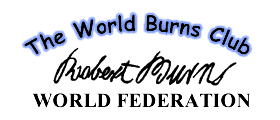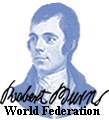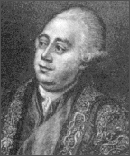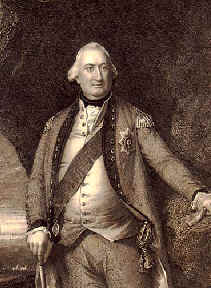


 |
 |
 |
|
Especially for
our friends in The USA & Canada, this "Expert Analysis" article focuses
on the thoughts & views Robert Burns held on the American War. Typical
of Burns, he does not skip gently around the edges, but chooses to portray
the facts (as he understood them to be at the time) in a very blunt yet
intelligent and witty manner. He had a very strong knowledge and understanding
of what had taken place during the American War and the poem provides
an excellent example of his ability to portray history in the making.
Enjoy !
Expert Analysis by Dr. James A Mackay One of Burns's earliest songs with strong political overtones is the Ballad on the American War. It seems to have been composed in 1784, barely months after the struggle between the American colonies and the mother country had been brought to an end. Vigorous and well-crafted, it was one of Burns's best compositions of the early period but it was too sensitive politically for inclusion in the Kilmarnock Edition. |
|
| In
December 1786 Burns wrote to Henry Erskine, the Dean of Faculty and one
of his new-found Edinburgh friends: - "I showed the enclosed political ballad to my lord Glencairn, to have his opinion whether I should publish it; as I suspect my political tenets, such as they are, may be rather heretical in the opinion of my best Friends…... His Lordship seems to think the piece may appear in print, but desired me to send you a copy for your suffrage." Erskine concurred and, as a result, it was included in the first Edinburgh Edition. Interestingly, the air which Burns selected for it was known at that time as the Earl of Glencairn's, having been published under that title in McGlashan's Strathspey Reels (1780), although nowadays it is better known by its original name of The Black Watch. Many later editions of the works of Burns, however, preferred the rollicking Jacobite melody Killiecrankie instead. As a summary of events in North America over the preceding decade it is without peer for sharp observation tinged with biting wit. To readers in 1787 it would have possessed the extra advantage of immediacy; they would all have been quite familiar with the personalities and events it depicted and would relish the sly digs and allusions which are lost on a present-day audience who do not have an intimate knowledge of the period. So let us take it line by line and see what sense we can make of it. When Guilford good our pilot stood, An did the hellim thraw, man; |
|
|
Straightaway we have a problem, for Guilford alludes to the son of the first Earl of Guilford, best known to posterity as Frederick, Lord North (1732-92). He served as prime minister from 1770 onwards and thus played a major part in the events leading up to the American War, hence the allusion to him as the pilot turning the helm of state. He remained in power until news of the ignominious surrender of Cornwallis at Yorktown in 1782 made resignation inevitable. He cobbled together an alliance with Charles James Fox in April 1783, under the titular premiership of the Duke of Portland, but this uneasy coalition fell apart eight months later and Lord North then retired from politics. |

The Earl Of Guildford |
|
Ae night , at tea, began a plea, Within America, man: Then up they gat the maskin-pat. And in the sea did jaw, man; This is a reference to the Boston Tea Party of 1773. Trouble with the American colonists began when North's government decided that they should pay for their defence against French encroachment, the money to be raised by a series of excise duties on, among other things, tea. In retaliation, a group of hotheads in the Massachussetts port of Boston boarded an East Indiaman, newly arrived, and dumped her cargo of tea into the harbour. A maskin-pat or pot was a kettle. An did nae less, in full Congress, Than quite refuse our law, man.
|
|
|
Cornwallis fought as lang's he dought, An did the buckskins claw, man; But Clinton's glaive frae rust to save, He hung it to the wa', man. Saratoga was the turning point in the conflict, closely followed by the alliance of France and Spain with the colonists against Britain. Sir Henry Clinton succeeded Howe as commander-in-chief but he was powerless to reverse American successes in the north and on hearing of disasters in the south, turned back to New York, hence the reference to him hanging up his 'glaive' (sword). The war dragged on until 1781 when Marquess Cornwallis (1738-1805) was compelled to surrender at Yorktown. Thereafter, although Britain and America remained at war, there was effectively little action as both sides manoeuvred to find the best peace deal. A preliminary peace was signed in November 1782, followed by a definitive treaty in September 1783. In the interim British land and naval forces were gradually evacuated. |

Marquess Cornwallis |
| Although
the war was over, the aftermath was bitter, as the different political
factions at home wrangled over the debacle. The remaining five stanzas
(more than half the total length of the poem) are taken up with the bickering
that ensued. Then Montague, an Guilford too, Began to fear a fa', man; And Sackville doure, wha stood the stoure, The German chief to thraw, man: John Montague, Earl of Sandwich, was First Lord of the Admiralty during the war, though he is better remembered by posterity for his obsessive gambling. He would never leave the card table to eat, and so invented the snack that still bears his name. The Secretary of State for the Colonies was Lord George Germain (1716-85), third son of the Duke of Dorset. He was forced out of office in 1782 as a scapegoat for the war, and kicked upstairs to the Lords as Viscount Sackville. The 'German chief' was Prince Ferdinand of Brunswick, under whom Germain served at the battle of Minden. Germain's refusal to obey an order cost him the command of his regiment and a court-martial, but he was later restored to favour. Nevertheless, the stigma of Minden remained with him all his life. For Paddy Burke, like onie Turk, Nae mercy had at a', man; An Charlie Fox threw by the box, An lows'd his tinkler jaw, man. Edmund Burke (1729-97) and Charles James Fox (1749-1806) were the leading parliamentary orators of their time, and both fiercely opposed the American War. They led the campaign to topple the North administration. The rest of the poem (click here to view the entire piece) may be briefly summarised as it canters through the political infighting of 1783-4. Rockingham was Charles Wentworth, Marquess of Rockingham (1730-82) who briefly succeeded North as prime minister in 1782 'till death on him did ca' on 1 July that year. On Rockingham's death, King George summoned the Earl of Shelburne but he faced stiff opposition in the House of Commons (Saint Stephen's boys), and was defeated by the Fox-North coalition. Fox was an even more inveterate gambler than Sandwich, hence the card-playing metaphors of the seventh stanza. The 'diamond's ace, of Indian race' was Fox's East India Bill which 'led him a sair faux pas', a reference to Fox's unpopularity over his alliance with his old enemy North. Then the Saxon lads (the English) with loud placads (cheers) called on Chatham's boy (William Pitt the Younger) who became prime minister at the age of 24. To be fair, he had previously served as Chancellor of the Exchequer under Shelburne. Then Rockingham took
up the game, |
|